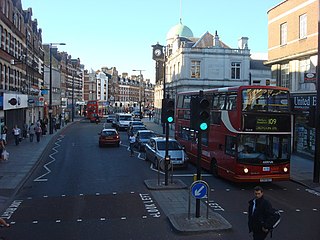Three anti-terrorism bills were enacted in the Australian Parliament in 2004 by the Howard Coalition government with the support of the Labor Opposition. These were the Anti-terrorism Bill 2004, the Anti-terrorism Bill 2004 and the Anti-terrorism Bill 2004.

The Racial and Religious Hatred Act 2006 is an Act of the Parliament of the United Kingdom which creates an offence in England and Wales of inciting hatred against a person on the grounds of their religion. The Act was the Labour Government's third attempt to bring in this offence: provisions were originally included as part of the Anti-Terrorism, Crime and Security Bill in 2001, but were dropped after objections from the House of Lords. The measure was again brought forward as part of the Serious Organised Crime and Police Bill in 2004-5, but was again dropped in order to get the body of that Bill passed before the 2005 general election.

The Terrorism Act 2006 is an act of the Parliament of the United Kingdom that received royal assent on 30 March 2006, after being introduced on 12 October 2005. The Act creates new offences related to terrorism, and amends existing ones. The Act was drafted in the aftermath of the 7 July 2005 London bombings, and some of its terms have proven to be highly controversial. The government considered the act a necessary response to an unparalleled terrorist threat; it has encountered opposition from those who feel that it is an undue imposition on civil liberties, and could increase the terrorism risk.

New Zealand lesbian, gay, bisexual, and transgender (LGBT) rights are some of the most extensive in the world. The protection of LGBT rights is advanced, relative to other countries in Oceania, and among the most liberal in the world, with the country being the first in the region to legalise same-sex marriage.
Anti-terrorism legislation are laws with the purpose of fighting terrorism. They usually, if not always, follow specific bombings or assassinations. Anti-terrorism legislation usually includes specific amendments allowing the state to bypass its own legislation when fighting terrorism-related crimes, under alleged grounds of necessity.
From 2000 to 2015, the British Parliament passed a series of Terrorism Acts that were aimed at terrorism in general, rather than specifically focused on terrorism related to Northern Ireland.
New Zealand has experienced few terrorist incidents in its short history and the threat is generally regarded as very low. However, the Security Intelligence Service (SIS) has warned against complacency. This article serves as a list and compilation of past acts of terrorism, attempts of terrorism, and other such items pertaining to terrorist activities within New Zealand. Significant acts of terrorism include the bombing of the Rainbow Warrior in 1985, an act of state-sponsored terrorism by France, and the Christchurch mosque shootings in 2019, a far-right attack which resulted in 51 deaths and 40 injuries.

The 2007 New Zealand police raids were a series of armed police raids conducted on 15 and 16 October 2007, in response to alleged paramilitary training camps in the Urewera mountain range near the town of Ruatoki. About 300 police, including members of the Armed Offenders Squad and Special Tactics Group, were involved in the raids, which involved the execution of search warrants at various addresses throughout New Zealand, and the establishment of roadblocks at Ruatoki and Tāneatua. The police seized four guns and 230 rounds of ammunition and arrested eighteen people. According to police, the raids were a culmination of more than a year of surveillance that uncovered and monitored the training camps.

The Counter-Terrorism Act 2008 is an act of the Parliament of the United Kingdom which increased police powers for the stated purpose of countering terrorism. The first reading of the bill was held in January 2008, and it received royal assent on 26 November 2008 following an episode of Parliamentary ping-pong on some of its most controversial issues.

The Terrorism Suppression Act 2002 is New Zealand counter-terrorism legislation passed under the Clark-led Labour government. Enacted following the September 11 attacks in the United States, the Act was designed to better address contemporary terrorism issues, both domestically and abroad. Until May 2019, the Act had not been formally used in a prosecution; however there were several failed attempts by the Crown to do so. Many individuals and organisations have however been designated as "Terrorist entities" under the Act's provisions, in line with UN Security Council designations. The Act was amended in 2007. In May 2019, a charge of engaging in a terrorist act was laid against Brenton Tarrant, the perpetrator of the Christchurch mosque attacks, under section 6A of the Act.

Kristopher John Faafoi is a former New Zealand Labour Party politician. He became the Member of Parliament for the Mana electorate in 2010. He did not contest the seat as an electorate MP in 2020 but continued as a list MP. He held a number of ministerial portfolios in the Sixth Labour Government from 2017, until he announced his retirement from politics in June 2022.
Ian Robert Flockhart McKelvie is a New Zealand politician. He represented the National Party in the New Zealand House of Representatives from 2011 to 2023.

The Sixth Labour Government governed New Zealand from 26 October 2017 to 27 November 2023. It was headed first by Jacinda Ardern and later by Chris Hipkins, as Labour Party leader and prime minister.

The Sentencing and Parole Reform Act 2010, now repealed, was an Act of Parliament in New Zealand that denied parole to repeat violent offenders, and imposed maximum terms of imprisonment on repeat offenders who commit three serious violent offences - unless it would be manifestly unjust. The law was known informally in New Zealand public, media and government circles as the "three-strikes law".

The Counter-Terrorism and Border Security Act 2019(c. 3) is an Act of the Parliament of the United Kingdom. It received Royal assent on 12 February 2019 and came into force on 12 April 2019.

The 53rd New Zealand Parliament was a meeting of the legislature in New Zealand. It opened on 25 November 2020 following the 17 October 2020 general election, and dissolved on 8 September 2023 to trigger the next election. It consisted of 120 members of Parliament (MPs) with five parties represented: the Labour and Green parties, in government, and the National, Māori and ACT parties, in opposition. The Sixth Labour Government held a majority in this Parliament. Jacinda Ardern continued as prime minister until her resignation on 25 January 2023; she was succeeded by Chris Hipkins.

On 2 February 2020, two people were stabbed in Streatham, London in what police termed a terrorist incident. The attacker, Sudesh Amman, was shot dead by the police. A nearby woman was slightly injured by broken glass as a result. At the time Amman was under active counter-terrorism surveillance, after having recently being released from prison on licence; he had been convicted in 2018 for disseminating terrorist material. Following the attack, the British government introduced the Terrorist Offenders Bill, a piece of emergency legislation intended to prevent those convicted of terrorist offences from being released early from prison.

The Conversion Practices Prohibition Legislation Act 2022 is an Act of Parliament in New Zealand that bans conversion therapy practices that seek to change or suppress a person's sexual orientation, gender identity, or gender expression. The Bill passed its third and final reading on 15 February, receiving royal assent on 18 February 2022.

On 3 September 2021 at 14:40 NZST, eight people were injured in a mass stabbing at the LynnMall Countdown supermarket in New Lynn, Auckland, New Zealand. The attacker, Ahamed Samsudeen, was being followed by police officers, who intervened during the attack and shot and killed him after he charged the officers. He was pronounced dead at the scene. The incident was treated as terrorism and was "ISIS-inspired" according to Prime Minister Jacinda Ardern. It was the second stabbing in less than four months to occur at a Countdown supermarket, the first being in Dunedin, and the first terrorist attack in New Zealand since the Christchurch mosque shootings in 2019.

The Three Strikes Legislation Repeal Act 2022 is an omnibus Act of Parliament passed by the New Zealand Parliament that repeals the elements of the Sentencing and Parole Reform Act 2010, which constitute the so-called three-strikes law. The bill passed its third reading on 9 August 2022 with the support of the governing Labour Party, the allied Green Party, the Māori Party but was opposed by the opposition National and ACT parties. The following year the Sixth National Government took power and has pledged to reinstate the three strikes law.










